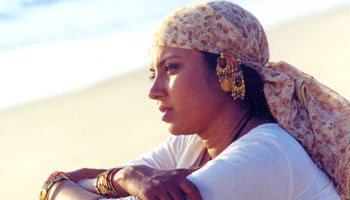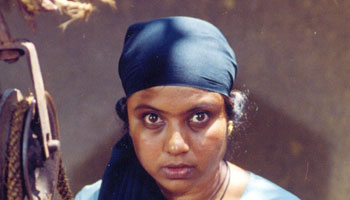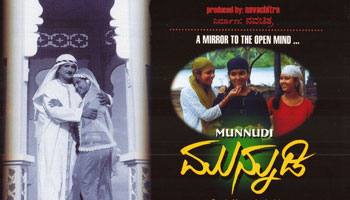




A powerful short story that has already made a mark in literary circles for its concern for society and people, a topical subject very close to reality, dealing with intense human emotions, intricate interpersonal relationships and the victory of the human spirit is very tempting for any film Director – particularly for a debutante like me. But then, it is a complex subject with a totally Muslim backdrop – rare indeed in Kannada films, nay Indian films. The challenge lay in telling the truth with sensitivity and responsibility, which demanded very close scrutiny of every word of the script, attention to authenticity and delineation. That its true spirit has been received with open arms and overwhelming appreciation by all sections speaks high of the maturity level of our composite society. That gives me a deep sense of satisfaction. I share this satisfaction and credit with all those who have made this film possible.

“Munnudi” is a preface written by the waves of Arabian Sea on the plank of the sand. An untold pain of a woman in a pictorial parody, a mirror to an open mind.
In Sheriah (Islamic Law) prostitution is deliberated as the worst crime on earth, which solicits heavy punishment to culprit’s life after death. “Munnudi” makes an attempt to discuss the misuse of ‘Sheriah’ by certain canny men, who maintain that they could elude both ‘Crime’ and ‘Punishment’ for transgression on woman by sheltering themselves beneath the testaments on ‘Nikha’ and ‘Talaaq’.
Munnudi is the story of a mother of a teenaged girl who lived in a small village on the coast of Arabian Sea, who raised the first dissident cry against the barbarian act of man, the act that every folk was made to believe, that cherished the sanctity of the Holy Book. ‘Munnudi’ is the story of the first woman who burnt her silence against this ritual, wherein every woman of the village was to go to bed as temporary wife with a new alien annually, decorating herself in trousseau.
Munnudi deals with this kind of gender discrimination – a crime perpetrated by man against woman in the guise of ‘marriage’.
The story goes like this. Mutthuchera, a tiny seaside village, has a special attraction to Arabian traders who have been regularly coming to this village. They come in a particular ‘season’ and stay on for about three months during which they settle contracts for buying wood, spices etc. Local traders vie with each other to woo the Arabians to their side by providing them all comforts including ‘temporary wives’. For this, they have evolved an ingenious method. They induce poor local women to agree to a ‘system’ in which they marry the Arabians and live with them as their wives in nearby posh hotels. After about three months, it is time for the Arabians to go back. They give divorce (Talaaq) before leaving. These women return to their huts and wait in silence for the next ‘season’ to become ‘new wife’ for some ‘new’ Arabian husband.
These women get some good money as Meher, as a part of marriage custom every time they marry. There are other inducements as well, like visa to their kith and kin to go to Arab countries for work. There are agents who fix such marriages for a commission. Their trump card is knowledge of Arabic language. For ages, these women have accepted this system as a way of life. No one questions the ‘sanctity’ of such events as everything is done as per the ‘rules’ of marriage (Nikaah) and divorce (Talaq); ‘Meher’ and ‘Visa’ are anyway too tempting for a woman struggling for two meals.

Meanwhile, sensing the concern of the local youth group, a ious religious leader explains the complexities involved in Nikaah and Talaaq and advises the group to deal with the situation as a social problem. This youth group becomes a stumbling block to the local trader and the agent. But the system has to go on, as otherwise the trader suffers! So, what was going on openly takes the form of secret marriages!!
As a part of his job, Hasanabba (the Agent) turns his attention to Rukhiya’s daughter. Rukhiya tries to avoid her daughter falling prey to such a system. She wants to marry her off to some local boy. But it proves impossible as no one is prepared to marry a girl whose paternity is not known – not even any member of the youth group!! This stark reality and the mounting pressures of the agent and the trader compel Rukhiya to painfully agree to such a ‘marriage’ for her daughter. But the sight of the corpse (floating in the river) of another girl recently married in such a manner unshackles her pent up anguish. She bursts into the trader’s mansion where the marriage proceedings are going on and stuns all the men folk by breaking the marriage of her daughter and vows to ensure that such a marriage will never take place in the village, thus taking a lead to walk away into freedom – freedom from fear and oppression.
This film is based on the short story ‘Mutthuchera’ by Boluwar Mohammad Kunhi, well known for pioneering the projection of various aspects of Muslim Life in Kannada Literature. Boluwar Mohammad Kunhi has won three Sahithya Academy Awards including Fellowship.
With this maiden directorial venture, P. Sheshadri, opens up a new avenue for fresh and sensitive subjects for films.
Produced by – NAVACHITRA
Direction – P.Sheshadri
Script – P.Sheshadri & Boluvar
Story-Dialogues – Boluvar Md. Kunhi
Cinematography – B.S. Shastri
Music – V. Manohar
Editing – B.S. Kemparaj
Costumes – Zubeda – Anupama
Make up – Kumar
Hasanabba – H.G. Dattatreya
Rukhiya – Tara
Abdullah – S. Venkatesh
Khazi – M.P. Venkatrao
Arabbi – C.R.Shashikumar
Adam – M.N. Suresh
Addu Uncle – Md. Kulaayi
Razak – Sreevatsa
Unnisa – Chayasingh
Saramma – Nandita
Ubaidullah – SudhiRaj
Hussain – Vidyadhar